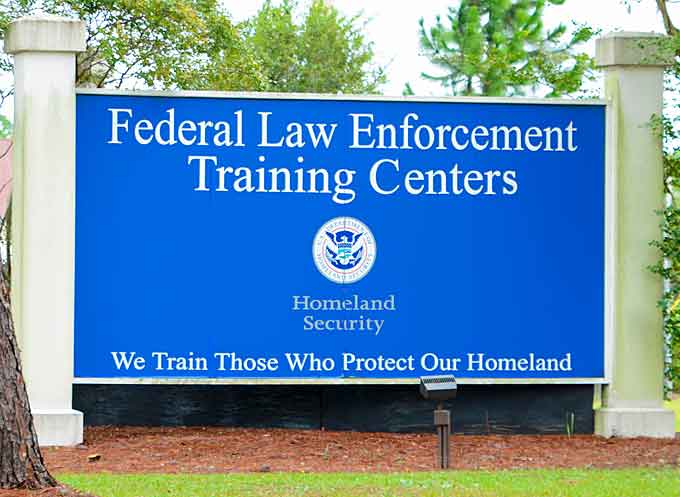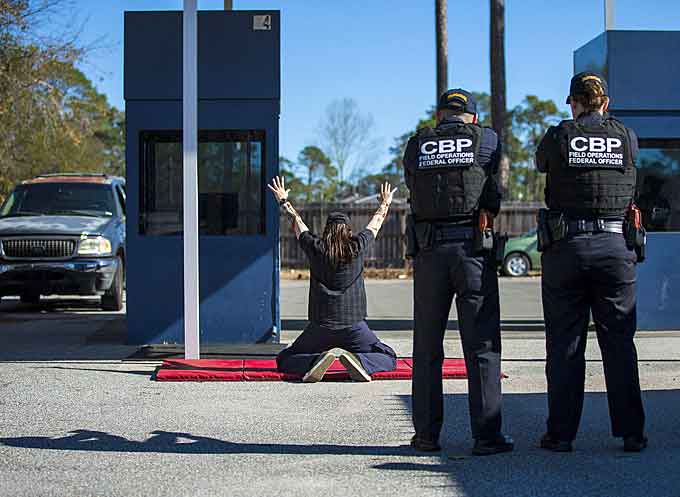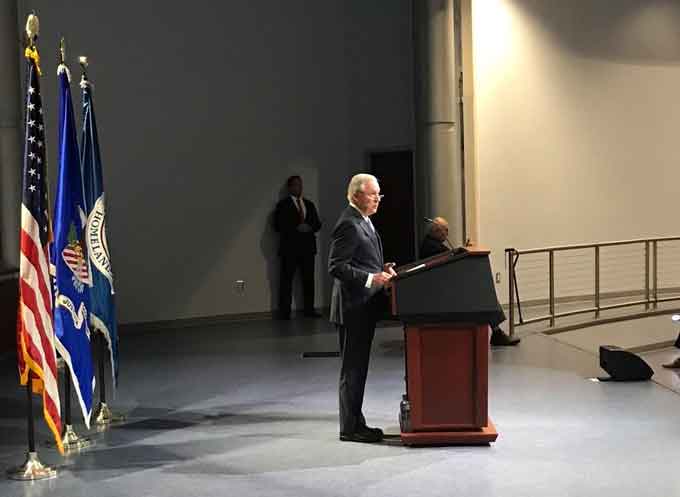
Remarks as prepared for delivery
Thank you, Tom, for that generous introduction, and thank you for your more than 30 years of service in federal law enforcement.
You spent most of your career securing our Southern Border and you helped CBP double the number of border patrol agents. That is important work.
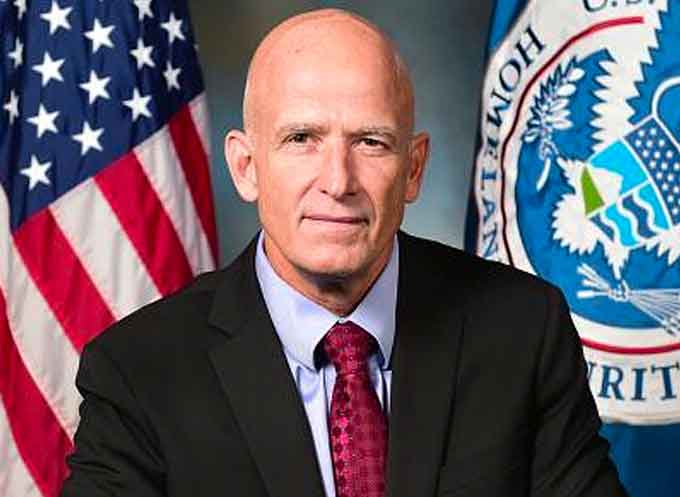
And Tom, thank you for the work that you are now doing to help train some 70,000 law enforcement officers every year.
Nationwide, more than 3,500 law officers from the federal, state, and local levels are receiving FLETC training right now.
About two-thirds of those are right here in Glynco.
I also want to thank Bobby for his work as United States Attorney. I’m told that Bobby has about 50 of his staff members here today.
Thank you all for being here and thank you for your service to the Department.
You have a great U.S. Attorney and a great mission.
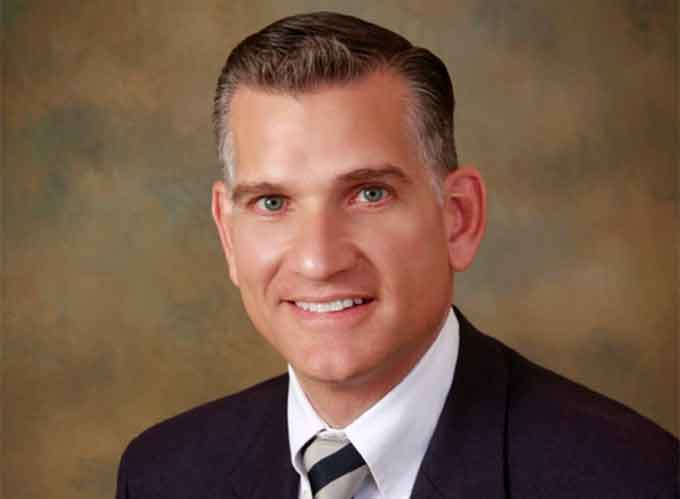
I want to thank all of the instructors, all of the law enforcement officers here from the Department of Homeland Security—and especially the 359 Department of Justice employees who are receiving training here in Glynco.
We have students here from FBI, 92 from ATF, 70 from the Bureau of Prisons, and 188 Deputy Marshals.
I think it’s important that you’re coming together, building relationships, and learning from one another.
I have been in and around law enforcement for nearly 40 years. I started as an Assistant United States Attorney; I was United States Attorney for 12 years; I served as Attorney General of my home state of Alabama, and I served on the Senate Judiciary Committee for 20 years.
(See Attorney General Jeff Sessions at the Federal Law Enforcement Training Centers. Dialog begins at 12:00 minutes into the video. Courtesy of the Federal Law Enforcement Training Centers and YouTube. Posted on Jul 23, 2018.)
Over those decades I have studied law enforcement issues and I have been all over the world.
I can tell you that no nation on Earth has a finer group of law officers than we have here in the United States of America.
You and your brothers and sisters are in every corner of America, working 24 hours a day to courageously and faithfully protect this nation and our people. We are proud of you.
And here at FLETC, you are receiving some of the best law enforcement training available anywhere in the world—and we are determined that you have the best.
And so I am here today on behalf of President Donald Trump and the Department of Justice to say thank you.
We appreciate and understand the value of your work.
We recognize that it was largely because of officers like all of you—with improved policies, leadership, technology, and techniques—that crime declined in America for 20 years.
From 1991 to 2014, the violent crime rate was cut in half. So were the murder rate and the robbery rate. Aggravated assault was cut by 47 percent, and rape was cut by more than one third. This was a monumental societal event.
Maybe some people started to take this achievement for granted. Some started to treat criminals like victims. And you like criminals.
But not this Department of Justice. We know whose side we’re on. We’re on the side of the good people, public safety, law, faith, and community. We defend our people and our values against outlaws.
You know the challenges we face. From 2014 to 2016, the violent crime rate stopped declining and went up by nearly seven percent. Robberies went up. Assaults went up nearly 10 percent. Rape went up by nearly 11 percent. The murder rate increased by more than 20 percent.
These numbers are shocking. They cannot continue.
Some people seem to think that crime rates are like the tides—that they just go up and down and there’s nothing we can do about it.
They think that rising crime is nothing to worry about—no big deal.
Some politicians seem to think we have more control over the global climate than over the local crime rate.
But the professionals in this room know that’s wrong.
Law enforcement can bring down crime rates. We make a difference every day across America.
This point was given a powerful support recently when Paul Cassell and Richard Fowles of the University of Utah analyzed the dramatic surge in Chicago homicides in 2016.
Homicides went from 480 in 2015 to 754 in 2016— a 57 percent increase in just one year. It was a stunning event.
They asked why. They considered numerous possible causes. They directly pinpointed the 57 percent increase to the abrupt decline in “stop and frisks” in late 2015.
There had been a horrific police shooting, protests, and an ACLU lawsuit. The settlement of that lawsuit resulted in a decline in stops from 40,000 per month to 10,000 per month.
Arrests fell also. In sum, they conclude that these actions in late 2016, conservatively calculated, resulted in approximately 236 additional victims killed and over 1,100 additional shootings in 2016 alone. These scholars call it the “ACLU effect”.
(Learn More. LEO Round Table (law enforcement talk show). Topic 1 concerns a new study by University of Utah professors Paul Cassell (law professor) and Richard Fowles (economics professor) that blames what they call the “ACLU Effect” on the spike in Chicago violence. Topic 2 concerns Chicago (Illinois) Police Superintendent Eddie Johnson rejecting a recommendation from the Civilian Office of Police Accountability to fire Officer Robert Rialmo for the shooting death of Quintonio LeGrier and innocent civilian Bettie Jones. LEO Round Table Episode 518 features Chip DeBlock (Host), Ward Meythaler (Attorney), Bret Bartlett, David D’Agresta, Cody Ann Cook, and John Newman. Courtesy of LEO Round Table and YouTube. Posted on Apr 3, 2018.)
I am sure that this does not surprise you experienced professionals.
You know as well as I do that if you want crime to go up, it’s easy: just let special interests like the ACLU run the police department. If you want public safety, call the professionals.
That is what President Trump believes and that is what I believe. That’s what this Department of Justice will fight for.
If you want more proof that policing affects crime rates, look at Baltimore.
From 2014 to 2017, the average number of field interviews conducted by police in Baltimore fell by 70 percent.
And if you don’t interview people, then you don’t find people with warrants—so that number dropped by half. Arrests fell, too.
That wasn’t because crime was decreasing. No, crime in Baltimore was surging.
Over that same time period, homicides in Baltimore increased 62.5 percent. Rape more than tripled—up 232 percent. Motor vehicle theft went up by nearly a third. Aggravated assault went up by nearly a third. Arson went up by 19 percent.
It is almost incredible—but Baltimore has an even higher murder rate than Chicago. People have been shot in a funeral procession and just outside of a police precinct.
There is a clear lesson here.
Policing affects crime rates and support for police affects policing. It is our partnership with our brothers and sisters in Blue — as we carry out proven policies — that reduce crime.
Public respect for our officers affects cooperation with the community—and it enables the kind of pro-active policing that has been shown time and again to work.
In January 2017, a survey from Pew Research Center found that 72 percent of the police officers they talked to said that they were less willing to stop and question suspicious persons than they were just a few years before.
Ninety-three percent said that their colleagues worried more about their safety than a few years before.
These numbers are troubling, too.
But we are supporting our police again.
We will always seek to affirm the critical role of police officers in our society and we will not participate in anything that would give comfort to criminals or radicals who promote agendas that preach hostility rather than respect for police.
(Learn More about FLETC. Courtesy of the Federal Law Enforcement Training Centers and YouTube. Posted on Jun 13, 2018.)
The day that I was sworn in as Attorney General, President Trump issued an executive order to enhance officer safety. This is a critical mission for the Department of Justice—period.
We believe that law enforcement is a noble profession and one that demands respect. Of course, we will continue to hold accountable any officer who violates the law and undermines the good work of our police.
But we will not malign entire police departments. We will not try to micromanage their daily work all the way from Washington, D.C.
We will encourage proven, Constitutional, and proactive policing that departments must do to keep America safe.
I believe that effort is already having an effect.
There was a survey recently that showed that more and more of our young people want to go into law enforcement. According to the survey, it used to be the number 10 dream job for kids under 12.
Now it’s number three overall—and for boys it’s number one. Athletes dropped while more and more want to wear the badge.

Courtesy of Fatherly and New York Lifex
That tells me that we’re doing something right. I have been hearing law enforcement leaders express grave concerns about recruitment—but maybe we have turned the corner.
Based on my experience meeting with officers like you, I believe that morale is already up among our law enforcement community. I can feel the difference. And we have good reason to be encouraged.
Any loss of life is one too many, but it is encouraging that the number of officers killed in the line of duty declined last year and reached its second lowest level in more than half a century.
That’s something that we all should celebrate and be thankful for.

Law enforcement is hard work and often thankless, but the right to be safe in your community is the right that enables the exercise of all our other rights.
So we’re going to keep supporting you. We are going to keep giving you the tools you need to keep your community safe.
Thank you all for choosing this difficult but noble work.
You can be certain about this: we have your back and you have our thanks.
– Attorney General Jeff Sessions












